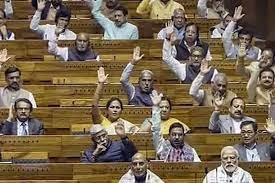The Lok Sabha passed the Chief Election Commissioner and Other Election Commissioners (Appointment, Conditions of Service, and Term of Office) Bill, 2023, on December 21, 2023, which governs the appointment, salary, and removal of the CEC and election commissioners (ECs).
The bill on the appointment of election commissioners was introduced during the monsoon session in August, months after a Supreme Court constitution bench ruled in March that election commissioners should be appointed by the president based on advice from a committee comprised of the prime minister, the leader of the opposition (LOP) in the Lok Sabha, and the chief justice of India (CJI).
With 12 MPs speaking, the bill for the appointment of election commissioners was carried out in less than two hours.
A new bill on appointment of Election Commissioners
The bill on the appointment of election commissioners was passed in the Lok Sabha on December 21 after a debate that lasted approximately an hour and 40 minutes and in the absence of the 97 opposition MPs who had been suspended for demanding a statement from Union Home Minister Amit Shah regarding the security breach in Parliament last week.

Following the passage of the bill, three more members of the opposition were suspended, bringing the total number of suspensions in the Lok Sabha to 100 and those in both houses to 146.
The debate was attended by 12 MPs, largely from the ruling Bharatiya Janata Party (BJP) and its allies, including the YSRCP, Shiv Sena, BJD, and TDP.
Only AIMIM MP Asaduddin Owaisi spoke against the bill in the Lok Sabha. While some have expressed concern that the bill endangers free and fair elections by giving the executive overt control, Union Minister for Law and Justice Arjun Ram Meghwal stated that the legislation was an “important task for the executive.”
“I brought this bill because this was an important task for the executive.” The architects of our constitution also enshrined the separation of powers in Article 50, which states that “the executive will do the executive’s work, the judiciary will do the judiciary’s work, and the legislature will do the legislature’s work.”

According to the legislation, the CEC and the ECs (the number of ECs will be established by the president regularly) will be selected by the president based on the recommendations of a selection committee.
The prime minister, a cabinet minister, and the Lok Sabha LOP (or leader of the single largest opposition party) make up the committee.
The bill (which was changed following its submission in the Rajya Sabha in August) now calls for the law minister to chair the search committee, which recommends five candidates to the selection committee.
Furthermore, the selection committee has the authority to consider candidates other than those recommended by the search committee.

The Rajya Sabha passed the bill for the appointment of election commissioners on December 12, with the opposition staging a walkout in protest of what they called executive overreach and a weakening of the Election Commission’s independence.












